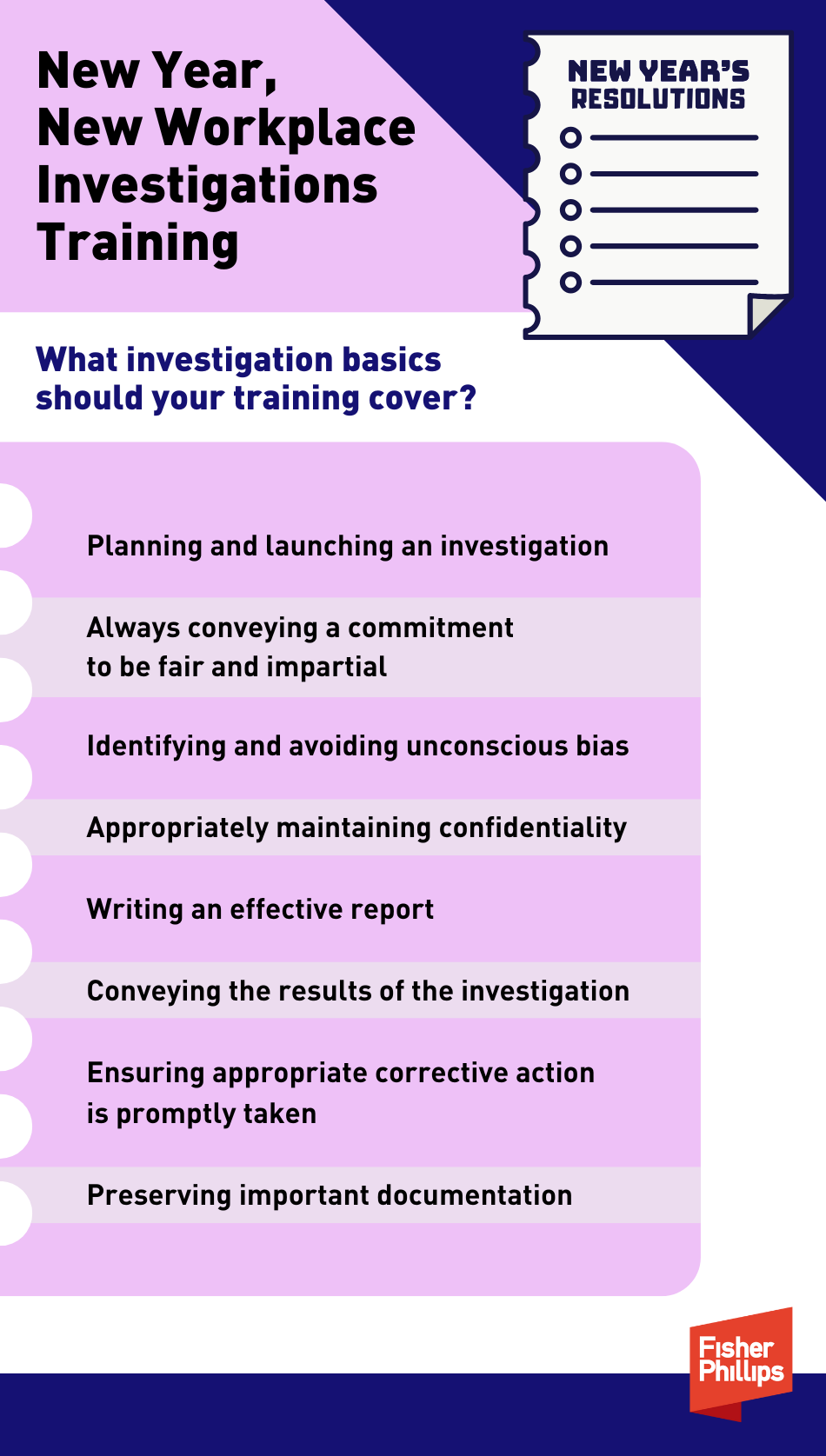Before the ink dries on your professional New Year’s resolutions, you may want to add “empower leaders with investigation training.” While most employers appreciate that complaints about potential workplace misconduct or other policy violations may require a prompt investigation, many don’t appreciate what can go wrong if one is poorly executed. The most straightforward way to limit botched investigations is to offer effective training to your personnel. This Insight will provide employers with answers to your most common questions and help you execute an effective workplace investigation training session.
Pop Quiz to Ring in the New Year
Before we begin, take this quick test. What are the most common hallmarks of a botched investigation?
- An investigator is busy with other work, so they delay the start of the investigation until next month when things have calmed down.
- An investigator is close friends with the accused but decides that they can fairly execute the investigation anyway.
- After receiving a harassment complaint, an investigator puts the complaining employee on leave until they can resolve the complaint.
- None of the above: all of these investigations seem to be started correctly.
- All the above, and more.
Give yourself a coffee break if you answered E. The above choices were inspired by real-life cases in which an employers opened themselves up to liability for poorly executed workplace investigations.
Your Questions, Answered
Below are answers to your most common questions on training workplace investigators.
1. Why should you train your employees on executing workplace investigations?
When properly trained, employees are more likely to execute workplace investigations in a manner that complies with company policy and ensures fairness and objectivity. Also, trained investigators are more likely to discreetly handle sensitive information and maintain confidentiality. Operating fairly and with discretion helps protect the integrity of the investigation and the privacy of those involved. A well-run investigation is more likely to achieve a fair outcome and prevent company problems from escalating. Training workplace investigators may also allow the company to improve its procedures and develop a plan to control ancillary factors such as media publicity.
2. Which employees should you train on executing workplace investigations?
Who will execute workplace investigations will vary by your size and the nature of your business. If your company has designated personnel who serve as investigators, this is a smart place to start. Because human resource professionals are often the first point of contact for employee complaints and play a central role in managing investigations, they are also commonly included in training. Frequently, front-line supervisors and managers are the first to hear about workplace issues and need to know how to respond, so they should also be considered for training on their role in the process. If your company has compliance officers, an employee relations team, or an internal legal team, they should also be in the mix.

3. What investigation basics should your training cover?
Solid training starts with the fundamentals, which often include the following:
- Planning and launching an investigation.
- Always conveying a commitment to be fair and impartial.
- Identifying and avoiding unconscious bias.
- Appropriately maintaining confidentiality.
- Writing an effective report.
- Conveying the results of the investigation.
- Ensuring appropriate corrective action is promptly taken.
- Preserving important documentation.
You can also train investigators on common pitfalls that may hamstring effective investigations. For example, you can train them to communicate effectively when addressing sensitive topics; to identify and consider all relevant evidence; to understand and follow applicable company policies; and to address unrelated but credible and concerning issues that may arise during an investigation.
4. What training should you provide on the types of incidents that could require an investigation?
Workplace investigations are commonly executed in response to allegations of harassment, discrimination, and retaliation. Understanding how to promptly and adequately respond to these types of allegations remains as vital as ever. But you should also train investigators on other types of incidents that may also require an investigation.
Because employers have a vital duty to provide their employees with a safe work environment, for example, investigations are also often necessary for workplace safety issues. If a health and safety concern arises, determining if an unsafe condition exists and correcting it immediately is necessary. The manner in which the concern is addressed is also critical. An employer who properly addresses a health and safety concern must also properly communicate that outcome to its employees and the steps it will take going forward. Failure to do so may lead to poor employee morale, continued complaints, and, in certain circumstances, whistleblower actions taken against the employer. There are many similarities between internal workplace investigations and safety investigations, but there are also some differences that are important for internal investigators to understand.
Additionally, it is also vital to conduct a proper investigation when you are on notice of potential criminal activity or misconduct. Sometimes these situations also warrant notification to law enforcement. These decisions should be made in consultation with senior leaders and counsel.
5. When should you consider hiring an external investigator?
Sometimes the best decision is to not use a company employee to execute an investigation. This can be the case for several reasons.
If a complaint involves senior leadership – like executives, board members, or human resource personnel – it might make the most sense to engage an impartial, outside investigator. Also, using an external investigator in cases of serious allegations, such as sexual harassment, discrimination, or retaliation, can lend credibility to an investigation. If there is a high risk of litigation or regulatory scrutiny, an outside investigator with legal or compliance expertise can help ensure that the investigation is thorough and defensible. If resolving a complaint requires technical expertise (such as whether health sampling is properly conducted or reporting requirements to federal agencies have been followed), your company may need an investigator with specialized knowledge. Lastly, if you simply do not have trained personnel to conduct a timely and thorough investigation, outsourcing the investigation can be a smart way to fill that gap.
6. When should training on workplace investigations happen?
The ideal time is not when a critical situation occurs and the need for an investigation arises. By then, it’s too late. Instead, the best time to prepare for a tough situation is when things are going well. All employers will eventually find themselves in a situation that requires an investigation. So, prepare now – before that need arises.
Conclusion
Fisher Phillips offers training in executing workplace investigations. If interested, feel free to contact an author of this Insight or a member of the Workplace Investigations practice group. You can also learn more about the Fisher Phillips Workplace Investigations Training Program here. Make sure you are subscribed to Fisher Phillips’ Insight System to gather the most up-to-date information directly to your inbox.
About the authors:
Erin Gibson Allen defends businesses in workplace law disputes, advises them on the compliance aspects of a wide range of federal and state employment laws and agency regulations, and counsels on all aspects of their employment relationships.
Before joining Fisher Phillips, Erin was a partner at a regional firm where she represented employers in various workplace matters including management training, workplace investigations, strike contingency planning, defense of FLSA claims, and government investigations. She also has experience representing employers in antitrust matters and complex litigation.
Arthur M. Wolfson is a partner in Fisher Phillips’ Pittsburgh office. He is a member of the firm’s Workplace Safety and Catastrophe Management practice group. He represents mining and industrial clients in their compliance with federal and state occupational safety and health laws and regulations. Arthur frequently litigates enforcement actions before administrative tribunals including the Federal Mine Safety and Health Review Commission (FMSHRC) and the Occupational Safety and Health Review Commission (OSHRC) as well as Courts of Appeals. He has participated in accident investigations and conducted internal investigations on behalf of clients. A substantial portion of Arthur’s practice is devoted to preventative measures, including compliance counseling and training.




Leave a Reply